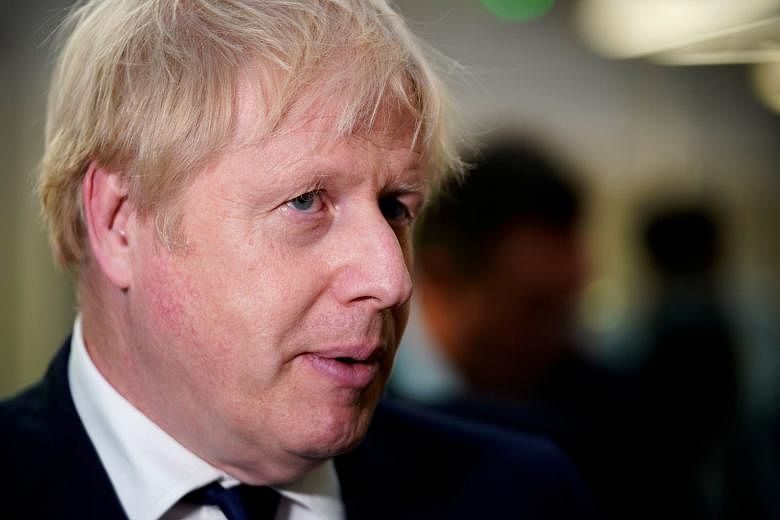LONDON (BLOOMBERG) - Boris Johnson will try to win business leaders to his side on Monday (Nov 18), offering them tax cuts as an olive branch for the disruption caused by Brexit.
The British Prime Minister will address the Confederation of British Industry's (CBI) annual conference in London, four years after pro-Brexit campaigners interrupted a speech there by his predecessor David Cameron to denounce the body as the "Voice of Brussels".
"Let's not beat around the bush, big business didn't want Brexit," Mr Johnson will say, according to speech extracts released in advance.
"You made that clear in 2016, and this body said it louder than any other. But what is also clear is that what you want now - and have wanted for some time - is certainty."
Before he became prime minister, Mr Johnson reportedly dismissed the concerns of industry with a four-letter epithet. Now his pitch is certainty. Having been the lead campaigner to get Britain out of the European Union, and one of the lead rebels who stopped a Brexit deal getting through Parliament, Mr Johnson is pitching himself as the man best-placed to lead the country on.
A slew of opinion polls in the Sunday newspapers all put his Conservatives well ahead of the opposition Labour Party. Though individual district polls showed the anti-Brexit Liberal Democrats surging in three London seats, the main picture was of Mr Johnson ahead.
But the week ahead features several potential landmines for the Prime Minister: He'll debate head-to-head with Labour leader Jeremy Corbyn on Tuesday, and the two men will appear separately, taking questions from a TV audience on Friday.
Meanwhile, Mr Johnson continues to face questions on a series of issues: There is a report into Russian election interference that his office suppressed, and his American entrepreneur friend Jennifer Arcuri, caught up in a controversy involving the prime minister, has given an interview to ITV saying she wishes Mr Johnson had declared their relationship as a potential conflict of interest when he was London mayor.
In an interview broadcast Sunday evening, she said Mr Johnson had cast her aside "like I am some gremlin".
Then there's the completely unforeseeable. Prince Andrew's interview about his relationship with the the paedophile financier Jeffrey Epstein is still dominating the headlines, and could yet have impacts beyond the royal family.
At the CBI, aiming to persuade business he has their best interests at heart, Mr Johnson will say a Conservative government victory at the Dec 12 election will mean a "fundamental review" of business rates and the tax on property; an increase in the threshold at which firms start paying employment taxes to £4,000 (S$7,033) from £3,000; an increase in the tax relief on buildings to 3 per cent from 2 per cent; and an increase in tax relief on research and development to 13 per cent from 12 per cent. The party said these measures, combined, would cost the government £1 billion a year.
The other side of Mr Johnson's case to business will be represented by Mr Corbyn, who will address the CBI conference after the Premier. Labour has already promised tax rises both for business and for the wealthy - a group that will include most of his audience.
Last Friday, the party shocked industry by announcing that if it won the election, it would take Britain's broadband infrastructure into public ownership.
Ms Carolyn Fairbairn, director-general of the CBI, said on Sunday that Labour's announcement had come as a "bolt from the blue" and left her members worried.
"I have talked to businesses who are already sitting there thinking maybe we're next," she told Sky News.
Mr Corbyn would struggle to portray himself as a friend of the corporate world, but will try to argue that a government he leads can still be an ally. He will promise that Labour would train 80,000 apprentice technicians and engineers a year.
"Climate Apprenticeships will offer training to school leavers and workers looking to change jobs mid-career, creating the engineers, technicians and construction workers we need to transition to a green economy," he will say. "The Tories have failed to invest in our economy."
Mr Johnson on Sunday revealed something that gives credibility to his claim that he can break the Brexit deadlock: every Conservative candidate has signed a pledge to vote for his deal if elected.
But while that could get his deal through Parliament, what's not covered by the pledge is how Conservatives will vote on subsequent issues in the Brexit process.
Mr Johnson is currently promising that the Brexit transition period, in which he aims to negotiate a free trade agreement with the European Union, will end in December 2020. If that proves ambitious - most deals take years to negotiate - he'll need members of Parliament to agree to a delay. If he wants a close relationship with the EU, it could be harder to get Tory support.
Foreign Secretary Dominic Raab, questioned about the plan for a trade agreement, admitted that it will necessarily be a compromise. But he said there's an opportunity to reach a "win-win" that is "great for the UK, but also good for our European friends".
Asked if the UK could leave the EU without a deal, Mr Raab said, "no, it's not what we want to do".
He clarified: "I don't think it's remotely likely."

